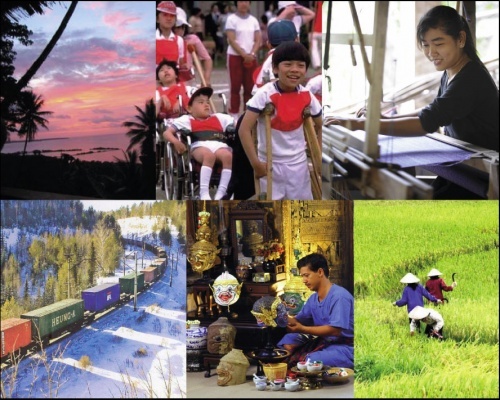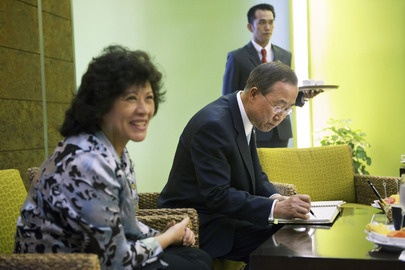


Developing countries can afford to provide universal basic social protection, the UN Economic and Social Commission for Asia and the Pacific says in an assessment, which formed the basis for discussions at the ESCAP Commission Session for Asia-Pacific governments being held in Bangkok. Basic social protection for all segments of the population is key to protecting people from extreme poverty and economic exclusion,
Smart Economics
“Social protection is not a cost, It is an investment and smart economics.” Noeleen Heyzer, the ESCAP Executive Secretary postulated.(Photo Above with UN Secretary General Ban Ki-moon). According to the ESCAP study, entitled “The Promise of Protection,” a universal basic social protection package costs no more than 3 per cent of gross national income (GNI) and is affordable at virtually any stage of economic development. (From ESCAP Statement & UN News Centre).
According to ESCAP, social protection should not be seen simply as a “handout,” but as creating conditions which help build a “staircase” for the most vulnerable to graduate out of poverty and exclusion. By reducing their vulnerability, a “social protection floor” provides the poor with the opportunity and confidence to take risks to improve their lives.
Sixty Asia-Pacific countries are attending the annual session, from Central Asia to the Pacific, Above is full Statement by the ESCAP Executive Director.
Related Reports:
---“Asia Economies-Higher Growth & Risks” -
diplomaticallyincorrect.org/films/movie/asia-economies-higher-growthrisks/26616
---“Caucasus & Central Asia-Strong Growth” -
diplomaticallyincorrect.org/films/movie/caucasuscentral-asia-strong-growth/26623
---“Women’s Rights=More Food” -
diplomaticallyincorrect.org/films/movie/womens-rightsmore-food/25377
By Ambassador Muhamed Sacirbey
Face Book at “Diplomatically Incorrect”
Twitter – DiplomaticallyX
Asia-Pacific governments agree on the need for universal basic social protection as a ‘staircase’ out of poverty and exclusion
Bangkok (UN ESCAP Strategic Communications and Advocacy Section) – Asia-Pacific governments attending a United Nations regional development forum here today agreed on the need for basic social protection covering all as a way out of poverty and exclusion for hundreds of millions of their people.
Providing universal basic social protection is not only affordable for most developing countries but also makes good economic sense, says an assessment by the UN Economic and Social Commission for Asia and the Pacific (ESCAP) which forms the core of discussions at the 67th ESCAP Commission Session for Asia-Pacific governments being held in Bangkok from 19 to 25 May.
A universal basic social protection package costs no more than 3 per cent of gross national income and is affordable at virtually any stage of economic development, according to the ESCAP study “The Promise of Protection” which guided a panel discussion of government leaders and senior policymakers during the annual ESCAP meeting.
“Social protection is not a cost,” United Nations Under-Secretary-General and ESCAP Executive Secretary Dr. Noeleen Heyzer told the Ministerial Round Table on the topic. “It is an investment and smart economics.”
The panel included H.E. Mr. Jigme Thinley, the Prime Minister of Bhutan, Ms. Margaret Wilson, Member of the Social Protection Floor Advisory Group and former Speaker of New Zealand’s House of Representatives and Dr. Mongkol Na Songkhla, former Minister of Public Health of Thailand and a key architect of Thailand’s universal health-care coverage scheme. It was moderated by well-known British Broadcasting Corporation (BBC) news anchor Nisha Pillai.
In presentations to the Round Table, Governments from Central Asia to the Pacific Island subregion outlined national social protection policies and programmes tailored to their specific socio-economic conditions. The presentations had a common underlying emphasis that Asia-Pacific countries at different stages of economic development prioritise investment in people as an investment in national economic and social well-being.
Summing up the discussions, Dr. Heyzer emphasized that social protection is also a question of entitlement and the state’s social obligation. “It is also a matter of rights. It is a social contract with our people.”
Social protection measures in the region include Bhutan’s policy for universal access to basic health and education services, Thailand’s provision of universal basic health care, China’s social insurance coverage to 1.26 billion people and India’s legal guarantee of 100 days of annual work to one member of every poor rural household. Pakistan has a universal cash transfer scheme targeting poor women, while Bangladesh has an employment guarantee scheme covering poor households.
Kazakhstan has a constitutional guarantee of basic social services, while Russia hiked government pensions by 26 percent and launched worker retraining programmes in response to the 2008 financial crisis. The Pacific island countries are seeking to provide basic social services to isolated rural communities.
According to ESCAP, social protection should not be seen simply as a “handout” but as creating conditions which help build a “staircase” for the most vulnerable to “graduate” out of poverty and exclusion. By reducing their vulnerability, a “social protection floor” provides the poor the opportunity and confidence to take risks to improve their lives.





